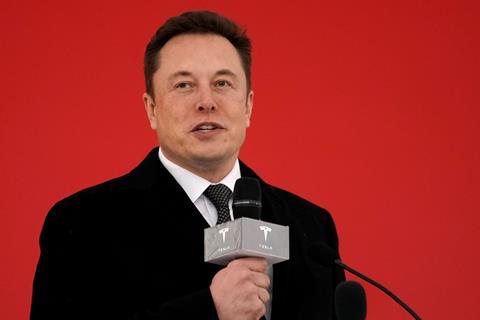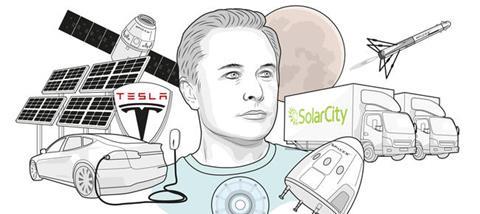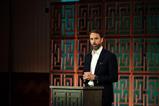The founder of PayPal, Tesla and SpaceX is on a mission to save the human race from extinction. Tim Bechervaise looks at what the Church can learn from this most unusual of entrepreneurs

A few weeks ago, something strange happened. Elon Musk’s name was being associated with something other than cars, AI or even space. Instead, to widespread curiosity, it was Jesus. To date, the clip of him talking with Babylon Bee about his admiration for Jesus has been watched more than 2.2 million times.
Musk’s words make for a compelling watch, but in many ways, this fascinating figure has been pointing to Jesus long before this interview took place.
“A Renaissance man”
There is a scene in Iron Man 2 where Elon Musk makes a brief appearance alongside Robert Downey Jr’s superhero character, Tony Stark. “I’ve got an idea for an electric jet,” Musk casually informs Stark, who replies, “You do? Then we’ll make it work.” And they probably would.
The cameo is a nod to the inspiration Musk was to the creation of Tony Stark in the popular Marvel films. Writing for TIME magazine’s ‘100’ issue in 2010, director Jon Favreau stated, “Elon Musk makes no sense – and that’s the reason I know him. When I was trying to bring the character of genius billionaire Tony Stark to the big screen in Iron Man, I had no idea how to make him seem real. Robert Downey Jr said, ‘We need to sit down with Elon Musk.’ He was right.” Favreau continues, “Elon is a paragon of enthusiasm, good humour and curiosity – a Renaissance man in an era that needs them.”
Who is Elon Musk?
Put simply, Elon Musk is a physicist genius whose scent for a good idea or two has taken him a long way. The 50-year-old is worth over $200 billion, according to Forbes, making him the second richest man in the world behind Amazon’s Jeff Bezos. Musk’s vast and multifaceted empire includes SpaceX, Tesla Motors and SolarCity, all of which were started with funds made from the $1.5bn sale of PayPal (the online payments system he co-founded with Peter Thiel) to eBay in 2002.
Musk is a compelling figure, driven less by money and more by a fierce determination to use technology to help save humanity.
The eldest of three children, Musk was born in Pretoria, South Africa, in 1971. He devoured sci-fi books as a child, prompting the nickname ‘Child Genius’, though this made him somewhat of a loner and a target for bullies. By the time he was 12, Musk had written the code for a video game called Blastar and sold it to a computer magazine for $500.
Musk was asked in a 2014 interview with The Daily Telegraph whether growing up in apartheid South Africa (where he stayed until he was 17 before moving to Canada) influenced his passion to address problems he viewed as affecting humanity. “I’ve never thought about that. Yeah, it probably did,” he replied. “But don’t forget that I also read a lot of comic books as I was growing up, and I think that might have influenced me just as much. I mean, they’re always trying to save the world, with their underpants on the outside or these skin-tight iron suits, which is really pretty strange when you think about it. But they are trying to save the world.” It’s hardly surprising, then, that one of his five children is named after the X-Men’s Professor Xavier.
Going galactic
Musk’s first major success was Zip2, an online city guide he founded with his brother. When it was sold to Compaq in 1999, he reportedly made $22m. After personally pocketing $180m from the sale of PayPal, the shape of Musk’s subsequent investment suggests those comic books had indeed left a lasting impression.
The bulk of funds ($100m) went towards SpaceX, a company created to revolutionise space technology, with the ultimate aim of colonising Mars.
Musk believes there are two paths facing humanity today. “One is that we stay on Earth forever and then there will be an inevitable extinction event,” he says. “The alternative is to become a spacefaring civilisation, and a multi-planetary species.” Another key goal of the company is developing reusable rockets.

Tragedy, failure and ambition
The remaining funds went towards two companies aimed at reducing humanity’s dependence on fossil fuels and so counteracting the problem of climate change: Tesla Motors ($70m), a luxury electric car manufacturer that has since expanded to provide energy to homes and businesses through battery technology; and SolarCity ($10m) which seeks to offer a cleaner and more affordable energy solution.
Despite his previous success, Musk has admitted he did not expect SpaceX or Tesla to be successful. But, as he is widely quoted as saying, “If something’s important enough, you should try. Even if the probable outcome is failure.”
Yet fail they have not, although that’s not to say they haven’t come close. In 2008, at the height of the financial crisis, his companies came close to collapse. SpaceX encountered three failed rocket launches and Tesla Motors’ flagship Roadster hit production problems. At the same time Musk was divorcing from his first wife, fiction writer Justine Wilson with whom he had six boys (the first of whom tragically died from sudden infant death syndrome at ten weeks old). Musk came within inches of a nervous breakdown.
But he pulled through, and today SpaceX and Tesla especially are thriving. In 2021, the former signed a $2.9 billion contract with NASA to send astronauts to the moon on the company’s giant rocket Starship. The New York Times reports that SpaceX is now “the highest-profile partner of NASA in its human spaceflight program”. Meanwhile, in January 2022, Tesla announced that it made $5.5 billion in 2021 (a 58% rise on 2020), although the company has faced investigation by the National Highway Traffic Safety Administration over safety concerns around its autopilot features.
Musk is also the visionary behind Hyperloop, a supersonic transportation system that will propel pods through an overground tube at a modest 760 mph, which several companies are seeking to develop.
Could technology destroy us?
Musk also sponsors OpenAI, a nonprofit research company that seeks to “build safe AI [Artificial Intelligence], and ensure AI’s benefits are as widely and evenly distributed as possible”. While recognising the value of AI, Musk has also highlighted its dangers.
During an interview at the AeroAstro Centennial Symposium, he said, “I think we should be very careful about artificial intelligence. If I had to guess at what our biggest existential threat is, it’s probably that.” It’s a concern shared by other prominent figures, including Microsoft’s founder Bill Gates and the late Professor Stephen Hawking.
At a primary level, AI is commonly used by many of us today (iPhone’s Siri or Amazon’s Alexa). Takeaway food delivery app JustEat has a chatbot that “sees AI integrated into the ordering experience to ensure that customers receive the best, round the clock support and service”.
Should it continue on its upward trajectory, AI will assist us in our personal and work lives and could even help eradicate poverty and disease. However, alongside its impact on jobs and potential to dehumanise parts of society, warnings have been expressed over the potential consequences of developing machines that match or surpass human intelligence, including autonomous weapons and wills that conflict with humanity.
Another concern for Musk is climate change, which had driven his projects around renewable energy and electric cars. The entrepreneur’s commitment to wean humanity off its reliance on fossil fuels and so avert the effects of global warming, is another example of his belief that technology will either kill us or save us.
Saviour of the world
Although Musk doesn’t claim to have any religious beliefs, his recent comments to Babylon Bee suggest a thoughtful interest in the person and teachings of Jesus.
Musk said he “agreed with the principles Jesus advocated”, adding: “There was great wisdom in the words of Jesus and I agree with those teachings. Things like 'turn the other cheek' are very important… Forgiveness is important and treating people as you wish to be treated. Love thy neighbour as thy self – very important.”
But as Musk seeks, to an extent, to learn from Jesus, can the Church learn from someone like him? While his fears about the dangers of AI may seem like the stuff of sci-fi films let’s not forget that Musk has already displayed a remarkable knack for anticipating where our tech is taking us.
The concerns of those who are more informed should at least prompt us to stay mindful of our reliance on technology and how developments could end up undermining the worth, purpose and safety of human beings, who have been created in God’s image. Likewise, his commitment to counter the effects of human wastefulness and care for the earth can be celebrated by all Christians who believe God entrusts us with the care of his creation.
While Musk’s faith in God is open to conjecture, what is clear is his faith in the ability of humankind to make technology our saviour rather than our slave-master – a form of faith promoted by films such as Interstellar, with its central premise that humanity must harness technology to allow us to escape our own, ultimately doomed, planet. Musk’s faith is in ourselves to save ourselves. With all his dedication and determination to seeing humanity overcome its own propensity for self-destruction (especially his dream to transcend our place in the universe by colonising Mars), perhaps Elon Musk is prompting onlookers to ask important questions that we as Christians can help answer.
As people begin to ask whether our beautiful but fragile world is part of a godless and random universe, on course for an inevitable extinction event, how can we show that it is in fact held in the hands of a sovereign and loving God? As people wonder whether humanity even deserves saving, how can we make the link to Jesus, who came not to condemn the world but to save it (John 3:17)?
And in seeking to answer these questions – and in all our endeavours to serve Christ and tell others about him – we would do well to learn from Elon Musk’s irrepressible drive to help save humanity, even if his well-intentioned efforts have yet to appreciate the biggest issue we face. Fixing the world is one thing, fixing the people who live on it is another. As Christian preacher Adrian Rogers put it, “The heart of the human problem is the problem of the human heart.” Even if humans do end up living on Mars, they will still need saving from themselves.
Elon Musk in numbers
$2.9bn
A contract SpaceX agreed with NASA in 2021 to send astronauts to the moon
2026
The year by which Musk hopes to begin sending humans to Mars
$100,000
The amount Musk hopes it will eventually cost to buy a ticket to Mars on a reusable rocket
624
Number of Superchargers available in the UK for a Tesla car to get charged
18
The minutes it could take to travel from Manchester to London on the Hyperloop
40
“There are way easier places to work, but nobody ever changed the world on 40 hours a week,” Musk once tweeted.
72 million
Number of people following Elon Musk on Twitter
Prophetic culture
Musk’s approach is by no means faultless. Cultivating a good work-life balance is apparently not one of his strengths, which may explain his unsettled love life. (In 2010 Musk married British actress Talulah Riley. Two years later, they divorced. Then in 2013 they got married again, before Musk filed for divorce a year later.) But he has nonetheless shown the value in taking risks, working hard and being innovative.
He is also unmistakably a man of his time, sensitive to the ways in which our world is changing. It’s an approach that makes him the success he is, notwithstanding a number of failures on the way.
Of course, Musk has the expertise to thrive in such a role, but spiritually speaking, is there is something the Church can be reminded of here?
Many of us are on catch-up, scrambling around to keep in step with cultural, societal and technological developments, which seem to grow faster with each passing year. In many ways, it’s understandable. The pandemic has stretched churches – and leaders especially – physically, emotionally and spiritually. Sometimes we need to survive before we can thrive.
But as normality returns (hopefully!), can we provide more space for the whisper of the Holy Spirit who is inviting us to take a prophetic look at what is going on around us and what lies ahead?
“You know how to interpret the appearance of the sky,” Jesus says in Matthew 16:3, “but you cannot interpret the signs of the times.” Paul, in Acts 17, gauged the spiritual temperate of Athens and used it as a stepping stone to talk the one true God. The prophets of the Old Testament were so effective because they shed light on the past and present, while calling for change in light of what was to come. The beauty of this was that it prompted change, inspired faith and invited hope.
The influential Swiss theologian Karl Barth famously said, “Take your Bible and take your newspaper, and read both. But interpret newspapers from your Bible.” These are timeless words of wisdom that, if taken seriously, will help the Church more effectively navigate the challenges and opportunities not just of today but tomorrow.
Musk points to Jesus
You may have grown tired of seeing Elon Musk crop up on your newsfeeds or trending on social media. It can be difficult to keep up with his latest innovations and comments, not to mention his occasional Twitter spats! But maybe this is no bad thing, simply for the reminder of the good things we can learn from him.
We don’t know where he stands personally with God – and he is certainly far from perfect – but these have never been a barrier to God using people before. While Elon Musk can’t save the world any more than Iron Man can, there are certainly a few ways in which he points to the One who has.




































